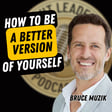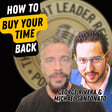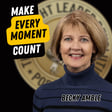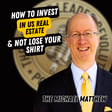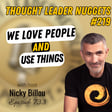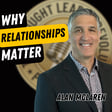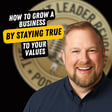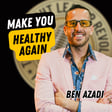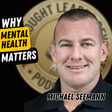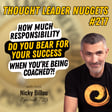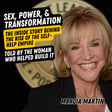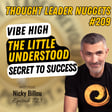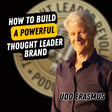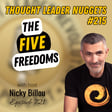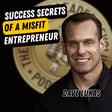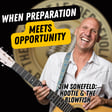Introduction and Guest Introduction
00:00:00
Speaker
Listen, if there's a part of your industry that's not being served, it may not be the most lucrative part of it, but if you solve a problem for somebody, they're going to trust you so much more. And a very specific problem, not just kind of a half-assed thing, you got to really solve the problem. And if you can come up with a way to solve problems for people, they're going to give you their trust and they're going to give you their future business.
00:00:26
Speaker
Welcome to the Thought Leader Revolution with Nikki Ballou. Join the revolution. There's never been a better time in history to speak your truth, find your freedom, and make your fortune. Each week, we interview the world's top thought leaders and learn the secrets of how they built a six to seven-figure practice. This episode has been brought to you by eCircleAcademy.com, the proven system to add six to seven figures a year to your thought leader practice.
Tim Larkin's Background and Career Shift
00:00:57
Speaker
Welcome to another exciting episode of the podcast, The Thought Leader Revolution. I'm your host, Nicky Baloo. And boy, do we have an incredible, exciting guest lined up for you today. Today's guest is a repeat guest and he's one of my favorite human beings on the planet. The reason I love and respect this guy so much is because he is not full of
00:01:20
Speaker
Kaka, like most of the human race these days, he speaks the truth. He speaks about a topic that makes a lot of people uncomfortable, but is an unfortunate reality that we all have to face. And he's the best in the world at delivering the goods to help keep you and your family safe. I'm speaking, of course, of none other than the one, the only, the legendary Tim Larkin. Welcome to the show, Tim. How you doing, Nicky? Man, I'm awesome, brother. Really, really great to have you here with us today, man.
00:01:49
Speaker
Well, thanks. Awesome, awesome. So Tim, it's it's been a little while since you've been on the show. A long time listeners know who you are. But there's a lot of folks who are new to the show. They may not know who you are. I know you really well. But tell us your backstory, man. Tell us how you got to be the great Tim Larkin. Let's go from there. Basically, I was a
00:02:11
Speaker
kid that was always interested in any aspect of self-protection. I was brought up in combat sports by my grandpa and my grandfather. Very, very familiar with it. To the point, I was a Navy kid. I lived on Navy bases my whole life, learned a variety of different martial arts in those Navy bases and just grew up around the military and decided that when I finished high school that I wanted to join the Navy
00:02:38
Speaker
VROTC, and I went to school, but my ultimate goal was become a SEAL officer. I had been introduced to the SEALs at a very young age through my dad. To decide that was what I wanted to do, I pursued that, did very well in my training, had a couple of weeks left in training, and then suffered a ear injury that ended my diving career.
Approach to Self-Protection
00:03:00
Speaker
It really kind of changed my life at that point. Up until that point, I was
00:03:05
Speaker
bigger, faster, stronger. I thought I was gonna have a very traditional special operations career. And the injured turned everything upside down, turned all my plans upside down. And it actually became the focus of what I teach people merely the I inadvertently discovered the Rosetta Stone to self protection by being injured. And really what I learned was that
00:03:30
Speaker
bigger, faster, stronger is excellent in a lot of areas, you know, there's there's a lot of reasons to, you know, use physical fitness and be strong and all that good stuff. But when it comes to actually self protection and violence that the human body is very susceptible to trauma, and that if we focused on the inherent areas of the human body that can't handle trauma, then that's a really easy way to train people how to protect themselves. And it's just an interesting
00:03:59
Speaker
juxtaposition because once people start looking at all humans as the same rather than most of us right now look at humans, you know, if we see a bigger, faster, stronger human, that's what we focus on the bigger, faster, stronger part. But when you're trained correctly, you look at a situation, you say, nope, he's got a neck like me, he's got knees like me, he's got ankles like me. It's just a different way of looking at the world from a self protected standpoint. And
00:04:25
Speaker
You know, that's kind of my Reader's Digest version. And I took this outside of the military. I was an intelligence officer. I was in the special operations community, but I wasn't an operator.
Civilians and Self-Protection Training
00:04:35
Speaker
But I was in a group that was looking at, you know, how to improve hand-to-hand combat in the special operations community, especially after the Berlin Wall came down. And they kind of predicted everything that's going on today, you know, 20-something years ago, that, hey, you know, warfare's going to change. We're going to need to put our hands on people. Well, that methodology,
00:04:54
Speaker
was something that I was part of. And I became an instructor in the system that we originally used with military. And then it just led to almost a 30-year career where I started out as a private military contractor and trained mostly law enforcement and military. And then after 9-11, I started training regular people in addition to my contracts. And today, I'm the point to where probably
00:05:25
Speaker
I would say 70% of my business is now teaching regular people how to better protect themselves. And it's really rewarding. Yeah. I remember when you and I first met, I had a good friend of mine here in Toronto, uh, which is a quote unquote, a very safe city. He was murdered in a restaurant. It was a high profile murder. Uh, someone walked into the restaurant. They had a hoodie on, they covered their face. Uh, they walked up to him and they pumped him full of four bullets.
00:05:52
Speaker
And this was a very high-end restaurant. I mean, they served $300 to $1,000 plate steaks at this restaurant. And it was in a nice, fancy part of downtown. And my friend was not part of any organized crime. He was a realtor, a father with two kids. And his life was snuffed out just like that.
00:06:15
Speaker
And I felt so helpless. I found your book, your New York Times bestselling book, When Violence is the Answer. And I read it and I devoured it in one sitting, you know, which I usually don't do with a nonfiction book. And then I came, I signed up to do your course along with my lovely, better half, Teresa, my good friend, Mark Van Muser, and a few other friends in Los Angeles. And it opened my eyes.
00:06:40
Speaker
as to what's happening out there and also the importance of self-protection. And I gotta tell you, I commend you for what you do, because what you're doing isn't just a business, it's God's work, it's teaching people how to be able to defend themselves. And I believe that in this day and age,
00:06:56
Speaker
more than ever, people need those skills. But I wanted to ask your thoughts about that. Given how the world has been with COVID and pandemic and civil unrest and election unrest, what are your thoughts on the necessity of people knowing the information that you teach today versus even three or four years ago? Yeah, it's funny. People used to tell me, hey, what was the seminal point for you? And the last big change in my business was 9-11.
00:07:23
Speaker
I mean, it was just a systemic change in society and how they viewed violence, but it was very different. I mean, what's just happened in the last year is so much more impactful than even 9-11, believe it or not, because 9-11 was a situation where we knew it was terrorists.
Societal Changes and Impact on Safety
00:07:44
Speaker
We knew it was specifically planes. We knew it was a specific deal.
00:07:50
Speaker
Our communities were still intact. We still had basically faith in our institutions and we really didn't have too much interest. Secondarily, after 9-11,
00:08:04
Speaker
2008, the crash of 2008 here in the US actually saw a huge rise in crime, desperation. It subsided pretty quickly, but probably two years later, a lot of that was under control. And the reason was last time, in 2008, people lost their homes and they've lost things, but they still had their jobs. They still were able to provide for their families. What's just happened in this last year is just unthinkable.
00:08:32
Speaker
So many people have lost their jobs in the U.S. Our economy is there. There are a lot of people are now dependent on getting some sort of government assistance. We saw situations in the U.S. where cities literally were taken over by, you know, protesters and then just things that just would have been absolutely unthinkable happened, you know, had situations where
00:08:58
Speaker
Police were not responding to calls. You had a mother with her kids in a car being surrounded by a gang of just protesters. And she was told, I'm sorry, there's nothing we can do. We can't send anybody out your way. There's a collapse in society that
00:09:20
Speaker
We haven't seen in our lifetime like this what was acceptable. We saw violence and things happening where it was just unthinkable to the community and it's really damaging the community and really shook the faith of everybody. I was never anybody that was a big prepper in the extreme ways that you saw prior to COVID.
00:09:48
Speaker
But I always thought basic preparation was something that you should absolutely do. It's amazing to me how quickly
00:09:58
Speaker
is what everybody always put in, how quickly society just, you know, the illusion that we have these safety zones put in and that we have institutions that will always respond to, you know, protect the public. And you saw how quickly that all just, you know, just erupted and just went away. Yeah. And it was unthinkable. So it's really shaken a lot of people. And here in the US, we've seen, you know, unbelievable amounts of gun sales. I mean, you know, over 9 million new gun registered gun owners.
00:10:28
Speaker
And an interesting part of that statistic is a big majority of that is single black women out here. And so you're seeing people are just really feeling very, very at risk. And of course, the first thing they want to do is they want to buy a gun in the US because it's available. It's available to people. But the scary part about that is, you know, a tool, buying a tool like a gun without proper training is really
Gun Laws and Personal Safety
00:10:57
Speaker
As you know, Nicky, I have a business out here in Las Vegas. We are a manufacturer of class III weapons. We have a tourist facility out here where you can come and you can shoot automatic weapons in a very safe environment. I know it sounds crazy, you know, crazy Americans. We like to let people shoot machine guns. But we have that, but we're very... My partners and I are very pro-Second Amendment, but we're also very pro-personal responsibility.
00:11:24
Speaker
And I think what's happened in this last year is a lot of people recognized, they saw things happen that they thought were unthinkable. They saw it happen to other people and they saw themselves realizing, I have nothing in the toolbox to deal with a situation like this. And it's really systemically changed. Even the censorship that you're seeing, even in my community, people have to be very careful what they put out.
00:11:51
Speaker
You know, I have a YouTube channel right now and it's been growing leaps and bounds, but I have to be very careful how I put the material out. I can't be as blunt as I'd like to be oftentimes because you will be deplatformed. You will be shut down. So even getting out good information is a challenge these days to people. It's a lot of, you know, supposedly well-meaning reasons that people are
00:12:20
Speaker
trying to control speech, it's really kind of had the opposite effect. So to me, it's a quandary. I mean, I think this is going to be, you know, after 9-11 was about five years where people were really concerned. I mean, they kept the concern level high. I think this is going to be generational. I think this is going to be something that's going to be a decade or more that people are going to really, this is really going to sit with them. And I think they're going to recognize that, hey,
00:12:49
Speaker
I went to my local supermarket and there were things I couldn't buy. Things were being rationed quickly. We saw how quickly our supply chains shut down. It systemically just got us to the point where people literally are thinking in a much more tribal way. I mean, neighborhoods here in the United States, people are responding as neighborhoods now.
00:13:14
Speaker
You know, stuff that used to be what would have been kind of dismisses overreaction and just, oh, God, crazy, crazy, only crazy people would do this. You've got neighbors now banding together. You've got people sitting there realizing, hey, if the police can't come, you know, we're going to put together, for lack of a better word, our own kind of neighborhood militia to deal with some things. And the reason I'm saying this, it's not happening everywhere, but it's happening in enough parts of United States to where it's just crazy.
00:13:44
Speaker
you know, to even think that it happened this quick. So, you know, like you said in Toronto, you know, in the event, your friend was murdered in a very safe city, in a very safe part of the city. And what that does, that shakes people to the core far more than if it happened in a dodgy part of town. Because what does that tell us? The illusion that we have is that
00:14:12
Speaker
is that, oh, well, society behaved a certain way until somebody decides not to play the game. And then it exposes just how exposed we are. I mean, this guy was able to walk right into the restaurant and murder your friend. And it was just there because we all were making the assumption that that just doesn't happen here. And yeah, so these Black Swan events, oftentimes, yes, they are. But just because that's the case doesn't mean that you shouldn't have some sort of
00:14:41
Speaker
preparation for things like this. And quite honestly, my main focus these days is on helping people avoid the avoidable. Because the other thing I'm seeing, Nikki, with all the political uprisings that we've had and the tumult that we've had, especially here in the US over the last election, people are letting their emotions dictate their responses. And people are getting themselves involved in something that's eminently avoidable.
00:15:09
Speaker
But they commit themselves to the point to where now it's going to get physical. And I see so many unnecessary acts of violence that when you look at the beginning of where it actually started, you could have avoided it. You just have to be able to keep your ego in check. So I guess it's funny. I've always had a passion for this. I don't think I've ever been so passionate about getting the information out.
00:15:39
Speaker
because I see so many people just making very dicey decisions and they're really playing with fire when they don't have to. And it usually comes from a lack of understanding of the tool of violence and how people respond using violence. What we don't understand is we don't understand that when we cross from the verbal violence into the physical, it's a completely different area.
00:16:05
Speaker
Once you put hands on people, you have no idea how it's going to end up either way. No matter what your intentions are, you can inadvertently cause grievous bodily harm or have grievous bodily harm done to you, regardless of what the intent is on either side of that equation. I collect a lot of news reports of two guys getting an argument. One guy pushes the other guy, he falls down, hits his head, and he's dead.
00:16:30
Speaker
You know, neither side ever wanted to get to that level, but they just don't understand it. Once you cross the physical plane, you know, all bets are off and you have to make sure that the only time you would ever do anything like that, that the threshold has to be extremely high for when you'd ever consider using violence to protect yourself. Yeah, 100%. You know, there's a lot to unpack in what you just said, but I'll tell you one of the things that
00:16:59
Speaker
I'm a Canadian, but I wish we had a second amendment here.
Legislative Challenges in Crime Prevention
00:17:02
Speaker
After my friend got shot, I was thinking, what if the restaurant had armed security? What if some of the people sitting at the restaurant had concealed carry like you guys do in the States? What if my friend had concealed carry? Would this guy have been so cavalier about stepping into that restaurant knowing that could
00:17:22
Speaker
that it could end really badly for him, right? You couldn't just walk in and shoot a guy and expect to get away with it like he did. I had a friend of mine say to me, hey, listen, if this had happened in Texas, that guy wouldn't have made it out the door. Well, I mean, there have been four guys that have taken him out by the time he'd taken three steps.
00:17:41
Speaker
You know, and it's it's crazy, but that's that that's the kind of thing that I think about right that we here Are are being told by the government? Oh, no. No, we're gonna protect you by taking guns out of your hands legally and I go, okay Well, what does that do to the criminals who?
00:17:56
Speaker
don't really care about the law. That just means anybody who's a good guy potentially and a law-abiding person is the one who would give up their guns and everybody else wouldn't. So, how the heck are we going to protect ourselves if true lawlessness and anarchy come to Canada? And, you know, underneath civilization, underneath that thin veneer of civilization, you know, at one level, we're
00:18:18
Speaker
we're animals and if our ability to take care of ourselves and our families, if we can't get food or shelter, I could see things going south even in a place like Toronto very quickly. Yeah, and that's what people don't understand. And again, I understand. I understand people being uncomfortable with the idea of gun ownership if you're uninitiated to it. And the thought process is
00:18:46
Speaker
you know that the problem is somehow with legal gun ownership and really the threat from legal gun owners is infinitesimally small. The abuse amongst legal gun owners is not the problem. What you see is exactly what you experienced in Toronto. The criminals are then absolutely brazen when they know they don't have to fear an armed population and they don't have to deal with any of that. And there's another incident in a nightclub in Australia.
00:19:16
Speaker
And it was the same thing. This guy just walked in really just brazen, just had the gun out. He knew nobody else in there had a gun and he was able to walk right up. And again, it was a, it was a criminal thing. It was a gang related thing, but it was done right in front of everybody with no, you know, just, just, just brazenly. And that's what you see when the result is as well-meaning as everybody thinks it would be like us trying to solve drunk driving by taking away everybody's cars.
00:19:47
Speaker
Yeah, it's crazy. You need to punish the result. And here in the US, it's proven time and time again, the problem isn't the firearms. The problem is we have a real mental health problem here in the US. It's not being addressed. And there's an issue with people getting access to weapons.
00:20:08
Speaker
that other people have, oftentimes parents or something like that, that a mentally unstable person gets a hold of a firearm. And it's a problem because we don't really address that aspect of it. This is the same thing when I dealt with this in the UK with the rampant knife crime. That's crazy what's happened there.
00:20:26
Speaker
Well, and the response to it was to, you know, just outlaw anything that looks like a knife. And I mean, to the point to where cutlery, normal, like butter knives and stuff like that, when you go to buy them, it literally has a warning on it not to misuse stuff like that. And the reason society defaults to something like that is a good feel good measure. It makes it makes politicians feel like they've done something without really tackling the problem. You know, and in fact, making it worse citizens
00:20:55
Speaker
Yeah, and we as citizens just have to recognize that. All we can do is if you're in a society that has a democracy or democratic process, you can try to make your vote count. But other than that, you really have very little recourse in a situation where they basically provided very little options for you to protect yourself as far as using tools or weapons.
00:21:24
Speaker
And it's just something to look at. I mean, the new administration that we have down here is trying to be very aggressive and trying to do some reforms. I don't think they'll be successful or as successful as they'd like to be. But that said, we have some real fear here in the U.S. and you can see it just from the gun ownership.
00:21:47
Speaker
There is a 13-month backlog in ammunition right now. That's how far behind ammo is with people. It's crazy. You got your dogs in the background, hey Tim? I'm sorry about that. That's so good. Hey. Add some flavor and color to the interview. I love it. Can you hold just for a minute? Let me get my dogs real quick. Yeah, for sure. For sure.
00:22:18
Speaker
All right, Tim. So, you know, we were talking about well-meaning politicians taking steps basically to do what they say or what they think is going to protect us, which is to take the legal right for somebody to have a weapon, a gun or a knife out of their hands. And the problem with this is that people who don't care about the law,
00:22:49
Speaker
they're going to just think, okay, well, nobody else has a gun or a knife. So I've got one. I'm going to be able to do whatever the heck I want. And no one's going to be able to stop me, right? Yeah. What people don't understand is the only thing that gun laws really work against any kind of like laws limiting any sort of personal protection. The only people are going to pay attention to it or the law abiding citizens. And so that's who you're penalizing in a situation like this, you know, and
00:23:18
Speaker
The response time of most, I remember when the Metropolitan Police in London came out and finally admitted, hey, we are not first responders. We will respond, but we're not able to be there to prevent the crime from happening. They actually admitted it, which we all knew, but to have an organization actually come out and say that, especially the organization over in the UK to do that, because they're very strict on their abilities for self-protection.
00:23:48
Speaker
you know, what you can do over there. And a lot of their laws over there were antiquated. They came out from a well-meaning thing, like the Brits actually used to have very good self-defense laws. One of their justices, Justice Black, was, you know, he said it was an inherent right of all citizens to, you know, self-defense was there, and it was actually very good up until the 50s. And in the 50s, they had
00:24:12
Speaker
They had street gangs. And what they had was a lot of street fighting going on. And the excuse used by people to participate in these things was, I saw somebody being attacked and I went there to help. And so what they did was they did they did a complete overreaction saying that if you try to intercede in anything, you know, the only people that are allowed to intercede in any sort of violent act are the police.
00:24:35
Speaker
the police, the first responders. And if you, if you, you know, literally try to go in to protect somebody, you will be prosecuted for external law.
00:24:44
Speaker
And that crazy really, they have old, they have old laws that just don't reflect the current situation. And then in London, what you had was you had a lot of immigration going on. And people coming in from countries that were basically saying, this is an anti-immigrant, this is reality. You had people coming into the into the country who were very used to having weapons, they come from, you know, societies where they needed weapons.
00:25:11
Speaker
And they looked around, the criminal element of those people looked around and said, Oh, you guys don't use knives because they tell you you can't get the readily available right here. You know, and they just do it. And that's, that's what people don't understand. You can't, you can outlaw tools. You'll never outlaw the intent to do violence.
00:25:32
Speaker
You know, and that's where we saw, we saw that in Paris. We saw that with people, you know, with all the truck, people using trucks as, you know, murder weapons to run people over and do things. People will find a way to do violence. And it is just counterproductive to think that by disarming law-abiding citizens that you're going to have anything, you know, close to
00:25:56
Speaker
you know, a safer society as far as you're talking about the criminal element, using using, if anything else, you have what you had, you know, you had that situation that you had in the really nice restaurant in Toronto, you know, where a guy just brazenly went in, murdered your friend shot him four times and literally walked right out, knowing full well, nobody else in that area was going to have a firearm, and that they basically could just come right in and
00:26:26
Speaker
you know, do as they please. Yeah, you know, I wondered to myself if this was in another place like Texas, what would have happened with this guy even dare to come into a restaurant, pull a gun on somebody, you know, or what do you thought twice because he knows that Texas is a place where there's a lot of concealed carry and frankly, even open carry.
00:26:50
Speaker
you know, if he'd have tried this in a restaurant in Texas, he wouldn't have gotten away with it. You know, somebody would have would have pulled a gun and shot him on his way out the restaurant. And the law enforcement officials in Texas would say, Bravo, you did our job for us. Right. Yeah. Yeah. Well, you saw that you saw that at the
00:27:09
Speaker
the unfortunate church shooting, where another individual who literally was from another church happened to see them leaving, was able to get the guy down and use his AR to take out the guys that just killed those people. People mistake the idea of wishing the way the world was a certain way, and they try to make laws.
00:27:37
Speaker
based on the way they think the world should be rather than the way the world really is. And it's my job to my clients is to make sure that, listen, I am not going to sit here and waste your time by trying to tell you, yeah, I agree with you. I wish the world was this way. I'm going to say, hey, here is the reality of what we're dealing with. This is the world as we know it. And in order to navigate it, you know, the safest way for you and your family, I'm going to give you the best information, even if it's uncomfortable information, I'm going to give it to you.
00:28:07
Speaker
I'll tell you, it is very uncomfortable information. When I came and I did your course originally, I was glad to do it because I figured I better find a way to protect and defend myself and the people that I love, but the entire time I was uncomfortable. I mean, the idea that I would need to act that way should the need ever arise,
00:28:27
Speaker
It made me very, very uncomfortable. My entire body was shaking. I felt some butterflies in my stomach. I didn't feel confident at all. And I was thinking to myself, man, what if this ever really happened? What if this ever really happened? What if I had to do this? Would I even be able to like...
00:28:49
Speaker
fall back on this training that I had. You know what I mean? Would I be successful or would I freeze? And those are the thoughts that went through my head, but I'm very glad I did the training. I'm very glad that my better half decided to do the training with me.
Personal Safety and Preparedness
00:29:04
Speaker
And I'm glad that we've at least been exposed to this information so that, God forbid, society goes to heck in a handbasket, we're able to do something about ourselves.
00:29:19
Speaker
A couple of days ago, cops came up to my townhouse complex and I knocked on my door. I opened the door and I'm wondering what they were doing there. The guy says, hey, did someone just make a whole bunch of noise climbing down from your rooftop? I'm like, no. He said, yeah, the neighbor across the street saw somebody jumping off a rooftop and running away. I thought, wow.
00:29:42
Speaker
Dang, and we've got security and special locks that you can't just get by. How did this guy climb up four stories, go on a rooftop of a three-story townhouse, and then jump off of that rooftop and get into the complex? If somebody can do that,
00:30:04
Speaker
then we're not nearly as safe as we think we are, right? That there's almost an illusion of safety. And like I said before, the civilization has this veneer over top of society. But if you take away people's feelings of safety and security when it comes to food, when it comes to being able to take care of their families, I think all of that
00:30:27
Speaker
could be gone in an instant and we could be in a Darwinian, you know, survival of the fittest situation before we know it. What are your thoughts on that? Yeah, well, that's just it. I mean, I try to tell people all the time, I mean, just look how quickly things digressed this summer, you know, last summer. I mean, it wasn't, you know, fascinating. I mean, it didn't happen everywhere, but it happened in enough large cities that, you know, we're unthinkable. I have friends that live in New York,
00:30:58
Speaker
I remember a buddy of mine called me up and he lived in the Upper East Side in an amazing penthouse and everything. I had done his podcast and he called me up a couple of months into the pandemic after things started happening. He said, hey, I need some help with some security equipment and cameras and stuff for my place and blah, blah, blah. I remember calling up and going, hey, Jim, your place is great.
00:31:26
Speaker
You know, the penthouse, you know, we already kind of went over that kind of stuff. What more do you want? And he goes, oh, I don't live there anymore. He had sold his penthouse at a loss. And he moved to Connecticut. You know, and that's, that's what you saw. You saw, I saw tons of my friends from the most affected cities and they just, they left because they felt it could, these are lifelong New Yorkers. These are lifelong people that lived in San Francisco, lifelong people that lived in LA people for, you know, Californians that would never want to live anywhere else.
00:31:56
Speaker
And yet they made this move because their physical safety was just, it was just not there. And it was amazing to watch. I mean, like I said, I never would have expected this from any, any of the people that I know. And yet that's what happened. And that's how quickly it happened. And, you know, so you're going to see people making those decisions. And quite honestly, I agree with what they're doing, meaning that's the ultimate. It's like,
00:32:24
Speaker
They have the ability, not everybody can just up and move. They don't have the financial wherewithal to do it. But the people that did, I understand why they did it. You know, because they have the ability to do it and instead of risking it and say, well, I'm going to stay put or I'm going to do whatever. They said, you know what? My family safety is an orphan. I'm out of here. And that to me said a lot.
00:32:45
Speaker
Yeah, you know what? I agree with them too. I'll tell you something. I've been thinking about buying some rural property myself and moving into a rural space with a lot more land. And I've never been a prepper before, but I'm thinking maybe it's not such a bad idea to have some extra food and water set aside in a place that's defensible. And you can see people coming, you know? Yeah. If anyone's coming.
00:33:16
Speaker
Uh, I think it might be a nice place. It's not crazy. Yeah. I just tell people all the time, you know, there's no penalty for being prepared. It doesn't have to be crazy stuff. You don't have to have a, a dugout underground house or anything like that, but just, you know, do you have, do you have enough water for a week?
Impact of Global Events on Society
00:33:35
Speaker
You know, do you have the ability to, uh, have, you know, food? Like I, I, I have stored away at least three months worth of food.
00:33:41
Speaker
that's usable, we've got basic water needs, and then a generator, and just, you know, just a couple of things. And I don't live in a rural part of Las Vegas, I'm in Las Vegas, I live in a very nice part of Summerland, which is a very nice neighborhood. But all of us around here, we all have our basics, just in case, you know, and that's not that's, you know,
00:34:04
Speaker
maybe a couple of years ago, everything I just said would seem like, oh, wow, you're really kind of paranoid, you're extreme. Right now, everybody's just, no, it's really smart. Yeah, it's really smart. Yeah, so we've changed, like I said, and I think this goes back to my original statement. I think since, you know, 9-11 was the last big thing I saw where people really, you know, understood that there was, you know, a potential threat to them that they weren't aware of before. And this, I think, is
00:34:34
Speaker
probably even a more telling situation. I've seen more people responding to this than I even saw people at 9-11 respond to. Well, I agree with you and part of what's having so many people be concerned
00:34:51
Speaker
is that there's a new administration in Washington DC that seems to want to take away their Second Amendment rights. And I gotta tell you, when my friend got shot, I became a big fan of your Second Amendment. I wish we had something like that here. Not that I think every human being on the planet should have the right to have a gun because there's some people with some serious mental health issues that shouldn't have the right to have a gun. And there's some people that frankly are criminals that shouldn't have the right to have a gun. But if you're a law-abiding person,
00:35:21
Speaker
and the world is about to go to heck in the handbasket, it's a really good idea to be able to have the means to defend yourself, you know, and be trained by someone like you, right? Yeah, and that's where, you know, my goal is not to turn people into, you know, like a Book of Eli type of person or Mad Max or something like that. My goal is for them just to understand, you know, what the parameters are.
Principles of Self-Defense and Conflict Avoidance
00:35:48
Speaker
You know, and when would you ever need to even consider using violence? And, you know, because most people don't. And most people don't understand how much they can get themselves in trouble by responding to things they don't need to respond to. And that to me is like, if I can just do nothing other than that for people, I think, you know, I'll be really satisfied. I mean, the best calls I ever get, Nikki, are the people that call me up and say, hey, Tom, I just want to let you know this happened to me last week.
00:36:16
Speaker
The old me would have responded this way, but after going through your training or reading your book or doing it, I responded this way and got myself out of there. And thank you so much. And to me, that's way more rewarding for me to hear that than to hear, Hey, Tim, you know, I had to use your information and I did this to this guy and that guy and I survived, you know.
00:36:37
Speaker
Or if I hear from my military and law enforcement guys that they were successfully able to use the training to protect themselves, I expect that to happen. But what's really great is when people don't have to use the information because, you know, I learned a long time ago that most people really don't want to learn self-defense and self-protection. You know, it's just not something that's inherently in there. Most people aren't like me and say my instructors and people that
00:37:01
Speaker
like me that like to do this training. Most people, what they really want is they want the best information possible on how to live a life that minimizes the chance that they would ever need self-protection or self-defense. And to me, that's the important message that I get out. So if I focus on anything these days, it's on how to live a life that would minimize the chance that you ever need this information to protect yourself.
00:37:32
Speaker
you know, so well said. I mean, what's, what's one of the things you, you, you taught me, uh, which is, you know, Nikki, uh, if I don't know somebody, uh, uh, I always proceed on the assumption that I'm six seconds away, uh, from that person engaging in the shooter shooting spree, right? I mean, why is that so important? Right. Yeah. And what that does is it's, and again, it's not being paranoid. It's, we never know what the other person, like when you meet somebody outside your circles,
00:38:02
Speaker
You have no idea who this person is, how they respond to things, what they're capable of. You can't, you know, if we could all just look at somebody and make a quick assessment and be right, that would be one thing, but that's, that's absolutely not true. But what that does is if you take it from that extreme standpoint in your head, like, Hey, this person might be six seconds away from shooting spree. I don't want to be the one to trigger it. How would you behave towards that person? Will you be very conciliatory? You'd be very friendly, very non-threatening.
00:38:32
Speaker
you just would have much better communication skills. And that to me is something that's absolutely invaluable because especially with like the Twitter universe these days and social media, people are very coarse with their communication styles. People are very harsh and people do things in their communication that they would never do face to face. And yet sometimes when we do get face to face, we forget
00:38:59
Speaker
that, hey, this isn't necessarily going to be just a verbal exchange from the other person's side because we don't know who they are. And something that we may be able to say to another person who comes from our same demographic background in there, who would probably just take it as a verbal threat and not want to accelerate it into physical. If you meet somebody from a different culture or different background or something like that to where what you could say to the one person
00:39:29
Speaker
in your office, you say the same thing to the guy out in the street and all of a sudden you find yourself in a very serious altercation. Yeah, that's not good. I mean, I was telling you the other week that I had a situation where I went to go buy something and somebody said something to me and we got into it back and forth and it very quickly escalated. And I sure as heck didn't want to escalate. I didn't want to be in a situation where it could get physical and thankfully it didn't, but it could have. And here's what I learned. I was, um,
00:39:57
Speaker
I was in a grocery store lineup and there was someone behind me and my mask, yeah, I wasn't wearing a mask, I was wearing one of those neck caters and I just put it down a bit to breathe, right? Because quite frankly, the only reason I wear those darn things is because there's a lot of grocery stores in Toronto right now who say, hey, we're not going to let you in if you don't have one and I need to eat, I need to have food for my family.
00:40:22
Speaker
I don't think they work. I don't think it's the right thing to wear them. But someone just said to me, you know, those masks work a lot better when you cover your whole face with them, including your nose. And it was the kind of thing that in the past would have had me just turn around and say something snarky back to them. And what I did instead is I look back for a second. I said, thank you. I kept walking forward.
00:40:45
Speaker
Yeah, you know and yeah that kind of diffused the whole situation I could feel their their kind of snarky energy Which was rising to a crescendo just was deflated because they were expecting me to argue with them and I didn't so moved on and I was out of there and It didn't escalate and that is the important thing Yeah, yeah, and that's exactly it and and when we when we live life like that it actually becomes you know, I
00:41:12
Speaker
just a lot easier. I mean, you've heard me talk about the idea of the three day rule that very few things meet the three day rule. And the three day rule is essentially this, whatever the incident is that you think you need to respond to, is it going to matter three days from now? You know, I mean, three days from now, if you find yourself in a jail cell, or God forbid, you're six feet under, will you have told yourself, yeah, there's no other way I could have responded to this. Yeah.
00:41:39
Speaker
Yeah, yeah. And the very, very few things meet that level. You know, Tim, that's why I value you in the work you do so much because you're somebody who speaks the truth. You tackle a very difficult subject and you do it in a way that makes it possible for someone like me to be able to take value from what you're saying and apply it in my life in a way that I don't get involved in dumb altercations that I don't need to get involved in.
00:42:08
Speaker
if, God forbid, I ever am in a situation where I need to make use of this information, I have the training that I went through to fall back on. So what you do is God's work as far as I'm concerned, and people need to hear what you have to say more than ever right now, in my opinion. Well, thank you. I appreciate that. I mean, I'm really enjoying the questions that I'm getting from people now, and it was nice to have you reach out to me
00:42:35
Speaker
on in a chance to share with your audience again, especially during this time, you know, the message because I really think it's a very relevant message right now because there are so many things that we want to respond to, you know, and that obviously are very emotional.
Business and Mission in Self-Protection
00:42:50
Speaker
And we've all had challenges. I don't care who you are. This pandemic has challenged people in every way, shape or form. Mentally, it's challenged us.
00:43:01
Speaker
Business-wise it's challenged us we've had to put up with things that just are really really tough to put up with regardless and you add on top of that human interaction and You just it's just a potentiality to get yourself in a situation that you really don't want to be in Yeah, well said really really well said so um
00:43:24
Speaker
Tim, from the point of view of someone who's listening to this, who's a business person, there's a lot that I think you can teach people. And I'd like to just spend a couple minutes on this. In terms of how to get your message out there in a way that has people go, wow, this guy's the real deal. This guy really gets it. He understands this area in which he's an expert in. And he's somebody I trust.
00:43:53
Speaker
You do that very naturally, but I'd like to spend four or five minutes just delving into that if you don't mind. What is it for you that makes this a mission for you? It's way more than just a business for you. This is a mission for you. It's a calling for you. What is it that has it be that? And why did you decide to make your mission and you're calling your business? You know, I think it always came down to something that it was just
00:44:23
Speaker
I had a relationship with learning to protect myself. I came from a family. The majority of my family is Irish and a background. I was raised, a young kid, I was raised to, one of the first things was how to protect yourself and take care of it. It was given very clear instructions, when and where it would ever be possible. There are parameters that were introduced to me and we've really gotten away from that. Especially with young males,
00:44:54
Speaker
Few young males have had the ability to learn how to protect themselves. And so what you'll see oftentimes is one of two things. You'll see people completely capitulate in situations because they literally have no information. Or, you know, they'll completely overreact in a situation and go far above what the response requires. Then on the women's side of things, I've never, you know, sexual assault has just happened at ever younger ages.
00:45:24
Speaker
You know, I don't train most males until they're at least 18, but women I'll train as young as 11.
00:45:30
Speaker
because of that. And women have a very different relationship to violence. But to me, it was crazy, Nicky, for me to go into it. All my friends went back when I was getting out of the Navy, you know, and I was passionate about doing this. And I was doing it as a contractor back then, a military contractor. All my friends were going to Wall Street. They were doing all sorts of stuff that was incredibly, you know, lucrative. But I had zero interest in it. People thought I was crazy to do what I was doing because it's not a traditional way to make money.
00:45:59
Speaker
It's not something that you'd immediately think, oh, we could have a really good career. But what was interesting was I was able to meet people that I never would have met had I taken a traditional career. I've met CEOs, I've met politicians, business leaders, movers and shakers, just amazing entrepreneurs who, if I had gone the traditional route, I probably wouldn't meet there. And what it taught me was, no matter who you are, no matter what your demographic is,
00:46:29
Speaker
Violence affects everybody across the board. It doesn't care about your gender. It doesn't care about your political affiliation. It doesn't care about whether or not you are a weak person or a strong person. We're all affected by it. And there's very little good information on how to navigate that. And to me, that was the that's what still to this day keeps me passionate about sharing that information.
00:46:51
Speaker
Yeah, I gotta tell you, the fact that you are passionate about sharing the information is what sets you apart and I think...
00:47:00
Speaker
people that are getting into business and want to use their God-given gifts to be of service to the world, they first need to get clear on what those gifts are. You know, Steve Pressfield wrote a book called The War of Art, and in it he says, everyone has a life they're living and a life that they ought to be living, and that we were all put here on this earth with a purpose given to us by God, and it's our job to discover what that is and then go and live that life.
00:47:28
Speaker
And you've done that, and that's one of the things I want to inspire everyone who listens to this podcast to go do if they're not already doing that. And the reason I'm excited about having you on the show is because you're a living, breathing example of that. I mean, I found out about you originally through my friend Mark von Meuser, who used to work with Tony Robbins,
00:47:50
Speaker
And Tony Robbins trusts you. He believes in you as the expert in the world when it comes to self-protection and helping people defend themselves from a social violence. So Tony Robbins has probably done more to help more people be successful in the world over the last 30 years than any human being alive. And when someone like that takes a look at you, Tim Larkin, and says, I trust this man, it just makes it a whole lot easier for
00:48:19
Speaker
people like me and quite frankly, a whole lot of other people to take a look at you and say, this guy's worth listening to. This guy's worth following. So I just want to say, I think it's, it's fabulous and amazing that you have the passion that you do and that you've been able to attract such incredible accolades from people like Tony Roberts. Well, you know, to leave something with your business folks, I'll tell you one thing that a very deliberate decision on when I decided to get into my world, I didn't try to do everything.
00:48:47
Speaker
Meaning I've picked one specific niche in there and really it comes down to what the term in law enforcement and military is, justified lethal force. I found that basically the most extreme circumstances, there was very little good information on how to navigate that. And it was kind of controversial. But what's interesting is because I became a subject matter expert there, people trusted me on everything else. And so, you know, I had a friend who
00:49:17
Speaker
He was in the insurance business. But what he found out was he said one of the biggest things, biggest problems one of his clients had was sending their kids to college. And so in the late 90s and early 2000s, he focused on using real estate to help fund your kids colleges. And that's what he did. What he did was he solved a problem first. And because he became a specialist in solving that one problem, they then trusted him in all other areas. And I get that benefit all the time. People come to me.
00:49:46
Speaker
And I can put them in touch with other subject matter experts because they trust me. Same thing with my relationship with Tony Robbins. It was because of how I handled him and his people long before he ever publicly said anything about me. I did a lot of private training with him and his folks because he had a real situation that he had had to deal with. So all I can tell people is, listen, if there's a part of your industry that's not being served,
00:50:14
Speaker
It may not be the most lucrative part of it, but if you solve a problem for somebody, they're going to trust you so much more and a very specific problem, not just kind of a half-assed thing. You got to really solve the problem. And if you can come up with a way to solve problems for people, they're going to give you their trust and they're going to give you their future business.
Resources and Recommendations
00:50:38
Speaker
Amen. Amen. Amen. Amen. You know, I wholeheartedly agree with that. And it's what I strive to do inside my business. And it's very important to understand who you want to help, why you want to help them with what problem you solve for them. And you said that brilliantly, Tim. Thank you. So, Tim, these days,
00:51:01
Speaker
there's really not much of a way for people to come and do your course live, but I think you've been one of the folks who's been able to create something online. So tell us a little bit about what you're doing online and how people can find out about it, engage with it, and frankly, buy your programs. Really, probably the best way, especially if this is the first time you've kind of heard about me, probably the best thing I could have you do is join my YouTube channel. It's just Tim Larkin, self-protection expert.
00:51:30
Speaker
Um easy to find online i've got so much free information on there and just real good actionable videos And yeah, and then obviously i'd love you to, you know, buy some products and do some stuff But the best way to do that is to first educate yourself because I want to make sure I can help you And that's why i've put the youtube channel up and it's just been growing leaps and bounds. So I I think that would probably be the best Value for your folks is if they just were able to get more information
00:51:57
Speaker
and see some video presentations that I've done that a lot of people find very helpful. Okay, great. Well, make sure we put up the YouTube channel in the show notes. And then there's your company website, Target Focus Training. We'll put that in the show notes as well. And your book, I think your book is something everybody should read. I don't often say this, but everybody should read your book. When violence is the answer, it's a difficult book to read.
00:52:25
Speaker
uh perhaps but it's also a book that's riveting the information in there is very powerful and if you've had a brush with violence i'll tell you this is a book that will help you feel confident strong and dare i say empowered and able to go out there into the world
00:52:42
Speaker
and feel that there is a path for you to be able to defend yourself and protect yourself should the need ever arise. And I think it's an important book. And frankly, Tim, if you got a few lying around the house, I'd like to buy a few and get you to sign them. I'm going to hand them out as gifts to some people I know. So be great.
00:53:00
Speaker
Oh, I appreciate that. Yeah, I'd love to do that for him. And yeah, and if people prefer audiobooks, it's on audio as well. Oh, cool. It's all, you know, very, you can get an Amazon, you can get it as far as, you know, wherever you plan by audible, if you if you want to get the audio book, it's really interesting. I didn't realize how much until my my publisher just told me I'm almost 5050 on audiobooks to hardbooks.
00:53:22
Speaker
So it's interesting how many people prefer audio but i did read it too so that that kind of helps also that's cool audio audio copy of it you know i i'm doing them andy for cell is seventy five hard program right now so when i go outdoors i usually take a.
00:53:39
Speaker
a power lock for 45 minutes. And one of the things I do is I listen to something, either a podcast or a good audio book. So this sounds like it'd be a great thing to listen to. Awesome, awesome, awesome, awesome. So Tim, we like to end off each episode by asking you as our guest expert to share with the audience your top three expert action steps. These are your three best pieces of advice to help my listener take his or her life
00:54:06
Speaker
to the next level, or frankly, to be able to better protect themselves. So what do you say? Yeah, you know what? It's just like anything. What I do every year is I learn a new skill. It can be anything. Like one year I did, I wanted to learn how to really lift competitively for kettlebells. And I did that. And then archery is going to be this year. And the reason, if I could tell anybody,
00:54:33
Speaker
pick a skill set, especially the older you get, the more important is to pick something new. And the reason you want to do that is because it's going to force you to, you know, it's going to take you out of your comfort zone. You're not going to be good at it. You're going to have to be a student again, and it makes you much better at whatever else you're doing in life. So for me, every time I take on a new skill set, guess what? I'm that much better of an instructor. Why? I'm way more compassionate to new people.
00:54:59
Speaker
because I just learned something that was completely new to me. And I realized how I had to break mechanics down and how I had to do things. And, you know, it does one thing, it gives me a new skill set, which is great. Number two, it makes me a better instructor in what I do. And number three, I'll probably learn something while getting instructed in the new skill set that I'm going to be able to use in there. Like some of my best innovations have come from other disciplines.
00:55:28
Speaker
You know, it's just a it was a teaching methodology they used. It was a way they did of explaining something that I never would have been exposed to. And yet I was able to bring it back into my world and make a huge difference for my clients. Man, that's really, really good. Okay, so that's the first one. What are two more, man? Give it to me. That's good. I like that. I'd say probably, you know, I don't see, Nick, I don't see enough curiosity. And let me let me let me tell you what I mean by that. You you have no idea
00:55:56
Speaker
Some of the people that you run into because they're not going to tell you who they are I can't tell you how many times i've gone to events And I end up talking to somebody and I just start asking them questions about their life And what they're doing and all of a sudden you realize oh my god, this person's a wealth of information That I never would have got but but they lack curiosity, you know For some reason we don't we like to talk about ourselves But we don't like to learn from other people meaning socially
00:56:27
Speaker
And I would just absolutely I was telling this to a group the other day That curiosity I think is probably one of the most undervalued skill sets that you can have it's not being annoying It's literally people actually enjoy it but and oftentimes I've met some people that were kind of reclusive They're kind of introverted but once you get them talking on their subject all of a sudden you've just gained tremendous knowledge of something that you didn't know and You have access to that person in the future because they're gonna they're gonna remember you in a positive light
00:56:56
Speaker
because you actually were asking questions and you're making it easy for them to talk. So that's probably my second big thing is remain curious. And then probably the third thing, and again, this is probably the older I get, the more I really, really embrace civility. And I think in this time right now, going out of my way to be civil to people and to be respectful of people, even when they don't deserve it,
00:57:22
Speaker
I think it's probably one of the best skill sets we could earn right now in this day and age. In this time in our lives right now, I think practicing stability is going to be extremely difficult, but ultimately, I think it's probably one of the best skill sets that we can focus on.
00:57:40
Speaker
So I gotta tell you something, Tim, I have loved this conversation for many reasons, but your three expert action steps are three of the best I've ever heard. The idea of taking on a new skill each year, sign me up, I'm in. In fact, I'm gonna do at least two new skills a year, cause I don't know how much time I got left and I want to get as many of these skills in as I can before I pass on. And, you know, the idea of being curious,
00:58:11
Speaker
I tell you, one of the reasons I do this podcast is I get to interview the world's smartest people and have an hour free coaching session with them. You know what I mean? I get to ask them questions. And I've learned so much from our conversation today.
00:58:31
Speaker
I gotta tell you, it's wonderful that I get to do this podcast and I get to be curious and ask questions, but it's also a good reminder to do that in arenas outside of this podcast. When I'm talking to somebody and I'm not interviewing them for the show and for the audience, it's still important to be very curious.
00:58:48
Speaker
And being civil, man, I learned that lesson just a couple weeks ago, and you reinforced it for me, so thank you very much, Tim. Thank you very, very much. Awesome stuff. Thanks very much, my friend. Oh, brother, I've really, really enjoyed this conversation. So, I'm going to speak to you, my listener, for a moment.
00:59:08
Speaker
Please make sure that you go to the show notes at thethoughtleaderrevolution.com or go on iTunes, Stitcher or Spotify. Look into the show notes there. Get the information about getting onto Tim's channel on YouTube. Get the information about getting onto his website and make sure that you get a copy of his book when violence is the answer. And look,
00:59:34
Speaker
If you're loving what you're experiencing on this show, I'm just gonna ask you to do one thing, okay? Write us a review, okay? And share this with three of your friends. Share this with three of your friends. That's all I'm asking you to do. Just make sure that we have the opportunity to have more people hear the good information that we have on this show. And the best way for us to do that, frankly, is through you as our loyal listener, taking you out there into the world. And listen, you know all about the amazing
01:00:04
Speaker
resources we offer on my website. You can go to EastCircleAcademy.com. You can pick those up. There's a whole bunch of free resources you can take advantage of. Make sure you take advantage of them and make sure that you 1000%
01:00:20
Speaker
Listen to what Tim has had to say here today and equip yourself to, frankly, be able to defend yourself should the need arise. Let's hope it never arises, but this is like insurance. It's better to have it and not need it than need it and not have it. Tim, my friend, thank you so much for being on the show with me today, brother.
01:00:41
Speaker
Thank you, Nick. You bet. And that wraps up another exciting episode of the podcast, The Thought Leader Revolution. To find out more about today's amazing guest, the one and only Tim Larkin, go to thethoughtleaderrevolution.com, check out the show notes, and to find out more about all the resources that we have available for you to help you grow your business, go to esircleacademy.com. Until next time, goodbye.
01:01:10
Speaker
This episode has been brought to you by EastCircleAcademy.com, the proven system to add six to seven figures a year to your thought leader practice.


